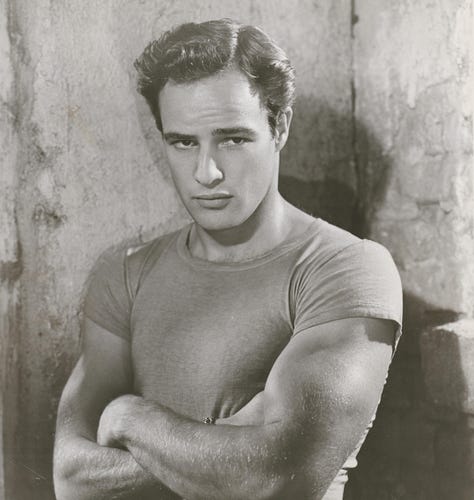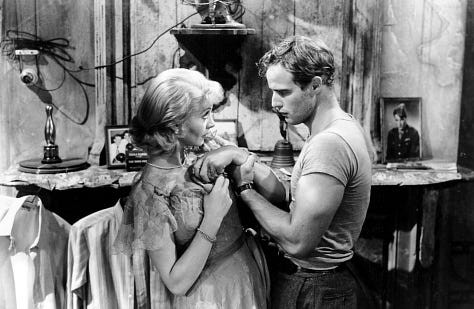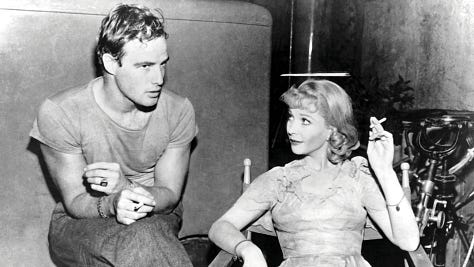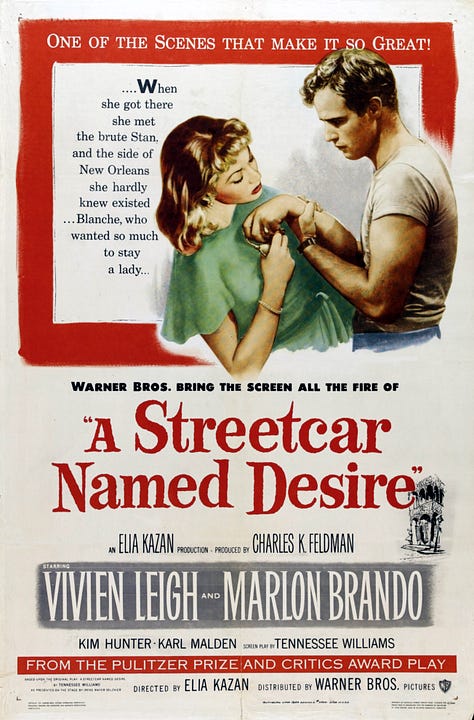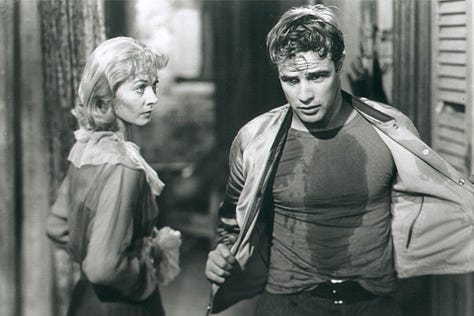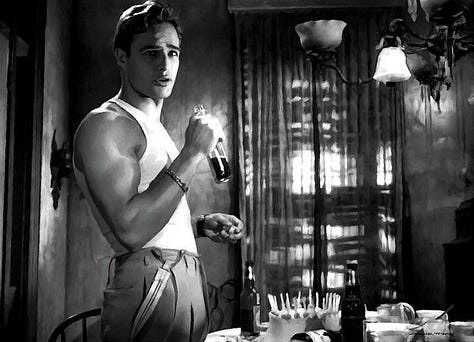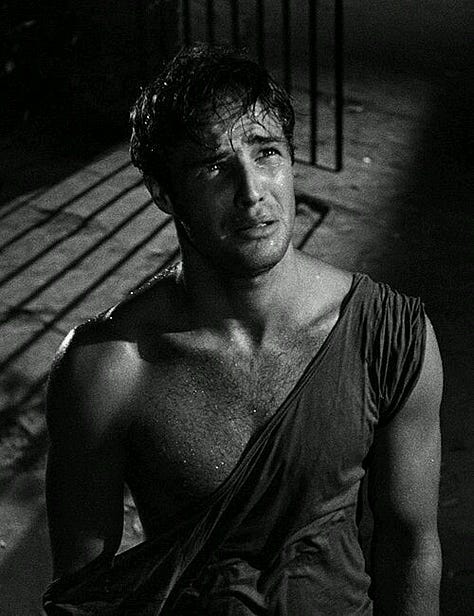A STREETCAR NAMED DESIRE
1951 • Elia KazanCast: Vivien Leigh, Marlon Brando, Kim Hunter, Karl Malden
Screenplay: Tennessee Williams; Oscar Saul (adaptation); Based on A Streetcar Named Desire 1947 play by Tennessee Williams
Cinematography: Harry Stradling
Music: Alex North
Warner Bros. Pictures
Stella! Hey, STELLA!
In this adaptation of Tennessee Williams' famous play, Blanche DuBois (Vivien Leigh), a fragile and emotionally vulnerable woman, seeks refuge from her troubled past. Blanche arrives at her sister Stella's (Kim Hunter) home in New Orleans. However, her delicate façade clashes with the harsh reality of Stella's working-class life and her brutish husband, Stanley Kowalski (Marlon Brando). As Blanche attempts to escape her haunting memories, she finds herself at odds with Stanley's raw masculinity and simmering aggression. Blanche's illusions unravel as she grapples with the harsh truths of her past, leading to a tragic confrontation with Stanley.
A Streetcar Named Desire boasts three Academy Award-winning performances. Vivien Leigh, renowned for her portrayal of Scarlett O'Hara in Gone with the Wind, delivers a mesmerizing performance as Blanche DuBois. Her portrayal of a woman haunted by her past earned her the Oscar for Best Actress. Kim Hunter, in the role of Stella Kowalski, portrays a woman torn between loyalty to her sister and her husband earning her the Academy Award for Best Supporting Actress. Hunter's performance skillfully demonstrates the emotional toil of a character caught in the crossfire of familial and marital conflicts. Karl Malden's performance earned him recognition with an Academy Award for Best Supporting Actor. Malden portrayed Harold "Mitch" Mitchell, a kind and sensitive soul who becomes romantically involved with Blanche. He brought a genuine and sympathetic quality to the role, providing a contrast to Marlon Brando's powerful and intense performance as Stanley Kowalski.
While Marlon Brando was nominated for Best Actor in his now-iconic role of Stanley Kowalski, he famously lost that honor to Humphrey Bogart (for The African Queen) at that year’s ceremony. Brando’s performance was raw, primal, and almost animalistic. Brando, often credited with popularizing the method approach to acting in the mainstream, brought an intense and visceral realism to his portrayal of Stanley Kowalski. His method acting involved fully immersing himself in the character's emotions and experiences. On the other hand, Vivien Leigh, who herself had a more formal and traditional acting background, approached her role as Blanche DuBois with a different style. Leigh's classical training and refined techniques allowed her to bring a nuanced and sophisticated layer to the character. The stark contrast in their acting approaches adds tension to the on-screen relationship between Stanley and Blanche. The chemistry between these two acting giants is a testament to their respective talents and how their differing styles enhanced the overall impact of the film.
There’s not much that hasn’t already been said of Tennessee Williams’ writing. The screenplay, adapted from Williams' own Pulitzer Prize-winning play, works incredibly well cinematically. The dialogue is rich with symbolism and layered meanings. The characters' interactions are laden with tension, desire, and vulnerability. Blanche's haunting soliloquies and Stanley's raw expressions of toxic masculinity beautifully counterbalance each other. The gradual unraveling of Blanche's illusions, the clash of contrasting worlds within the Kowalski household, and the culmination of the characters’ fates are all woven together perfectly.
Elia Kazan skillfully directs around the constraints of the Hays Code, a set of industry guidelines that regulated the content of Hollywood films at the time. The film's portrayal of raw sexuality and animalistic urges was groundbreaking for its era, pushing the boundaries of what was deemed acceptable on screen. Kazan's ability to convey the sensuality and primal instincts of the characters, especially in the context of Stanley and Blanche's charged interactions, showcases his directorial finesse. Kazan not only preserved the essence of Tennessee Williams' play but also started chipping away at the effectiveness of the Code itself.
A Streetcar Named Desire is an exploration of the human psyche, showcasing the clash between fantasy and reality in the sultry and sweaty backdrop of New Orleans.
I have always depended on the kindness of strangers.
Notable Awards & Accomplishments
Academy Award Winner: Best Actress (Leigh), Supporting Actress (Hunter), Supporting Actor (Malden)
Academy Award Nominee: Best Picture
Academy Award Nominee: Best Actor (Brando)
Streaming: Tubi
Digital Rental/Purchase: Available at major digital retailers
Physical Media: Available on Blu-Ray and DVD
